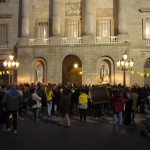According to the great cartographer of the modern era, Google, France and Spain are neighbors. However, I became skeptical of this fact during my trip to Barcelona, when I found that almost no one spoke French and it also wasn’t on any signs.
Besides the lack of French, I was also surprised to find that Spanish was not the first language on most signs. In Barcelona, their primary language is Catalan (Català in the language), which they proudly place above Spanish on all the signs in the city. Andrei Hahn, my traveling companion for this leg of the trip, had explained to me that Catalan was a different language, and that they spoke it in Barcelona. But perhaps because of his large curly hair, I didn’t take Andrei seriously, and just assumed Catalan was a dialect of Spanish—not a different language.
I met a man from Spain at our hostel named Jesús who broke it down for me. In Spain, there are three main languages spoken. Castilian is the Spanish spoken in Madrid, and the majority of Spain. Catalan is spoken on the eastern edge of Spain, where Barcelona lies. Finally, Basque is a language spoken by the Basque people, located in a patch of land in northern Spain, and the south-west tip of France.
Speaking to Jesús was wonderful because, although his English and French were quite minimal, and my Spanish nonexistent, we carried on a few conversations during my stay. It was truly amazing how we were able to carry on a discussion despite the thickest language barrier I have ever worked through. We would gesture, and look for commonly understood words, sometimes taking a while to say what we wanted.
He helped me with numbers in Spanish, and expressed how ridiculous he found French pronunciation. In Spanish and Catalan, what you see is what you get. He used “water” as an example. In Spanish, agua is pronounced ag-wa. In French, eau is pronounced oh. He thought this was absurd.
I also learned that he is now retired, and just travels all around the world. He was wearing a scarf from Sudan one day, and I think after Barcelona, he was going back to Africa. He was an incredible man, and told Andrei as we were leaving that we were young, and have better and more life ahead of us than he. Both Andrei and I disagreed though. I think he has marvelous adventures still ahead of him, and is doing things that I’m not sure if I will ever get the chance to do.
Talking with Andrei over a traditional Spanish lunch one of our afternoons, I mentioned how I sometimes wonder if it makes sense to have so many little languages spoken by such a small group of people in the world. Doesn’t it make it harder to communicate and come together? And is it really efficient to have an entirely separate language for so few people?
But Andrei saw it as a beautiful thing, full of richness and diversity. And, I think he’s right. It was hard for me to communicate with people outside of English and French. It was even sometimes hard for Andrei in Barcelona because of Catalan. Certainly, languages are used for communication, and the more people who speak a language, the more people with whom you can use it. But a language is also part of a culture and an identity. It forms how you think and process the world around you. To say that we could dispense with a language is very nearly the same thing as saying we could dispense with its accompanying culture. So, in Barcelona, they speak Catalan, but that’s not just part of the city, it’s part of the people.
- This was a protest against budget cuts for elementary education in Barcelona. I figured that out from a woman who knew no French or English, we just gestured and found a couple key words we both knew.
- This is a French supermarket that can also be found in Spain (as well as many other countries). Actually, it was one of the most French things I saw in Spain.

